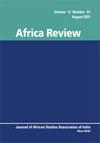The Neoliberal State and Management of the Covid-19 Pandemic in Nigeria
IF 0.5
Q4 AREA STUDIES
引用次数: 1
Abstract
This study examines how neoliberalism affected the management of Covid-19 in Nigeria. As a result of its emphasis on privatisation and austerity, neoliberalism discouraged social investment programmes and provisioning. The privatisation of Nigeria’s health sector severely stifled health financing, which led to the collapse of public health institutions and the proliferation of private and informal health delivery systems. It limited universal access to quality healthcare, worsened the health conditions of poor Nigerians and rendered the health sector incapable of managing emergency health situations, such as Covid-19. The absence of well-coordinated social investment programmes to cushion the effects of lockdown widened social inequality and misery, making it impossible for citizens in the informal economy to adhere to the Covid-19 guidelines. The state responded with repression to enforce the rules. This study recommends overhauling the Nigerian state and its political economy as a condition for reducing citizen’s vulnerability to a pandemic.尼日利亚新自由主义国家和Covid-19大流行的管理
本研究探讨了新自由主义如何影响尼日利亚Covid-19的管理。由于强调私有化和紧缩,新自由主义阻碍了社会投资计划和供给。尼日利亚卫生部门的私有化严重抑制了卫生筹资,导致公共卫生机构崩溃,私人和非正式卫生服务系统激增。它限制了高质量医疗保健的普及,使尼日利亚穷人的健康状况恶化,并使卫生部门无法管理Covid-19等紧急卫生状况。由于缺乏协调良好的社会投资计划来缓解封锁的影响,社会不平等和痛苦加剧,使得非正规经济中的公民无法遵守2019冠状病毒病的指导方针。政府以镇压作为回应,强制执行这些规定。这项研究建议彻底改革尼日利亚政府及其政治经济,作为减少公民对流行病脆弱性的一个条件。
本文章由计算机程序翻译,如有差异,请以英文原文为准。
求助全文
约1分钟内获得全文
求助全文
来源期刊

Africa Review
AREA STUDIES-
CiteScore
1.80
自引率
12.50%
发文量
22
期刊介绍:
Africa Review is an interdisciplinary academic journal of the African Studies Association of India (ASA India) and focuses on theoretical, historical, literary and developmental enquiries related to African affairs. The central aim of the journal is to promote a scholarly understanding of developments and change in Africa, publishing both original scholarship on developments in individual countries as well as comparative analyses examining the wider region. The journal serves the full spectrum of social science disciplinary communities, including anthropology, archaeology, history, law, sociology, demography, development studies, economics, education, gender studies, industrial relations, literature, politics and urban studies.
 求助内容:
求助内容: 应助结果提醒方式:
应助结果提醒方式:


